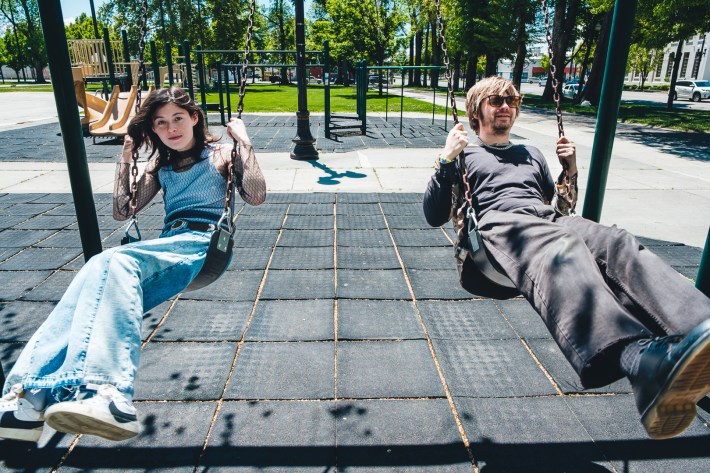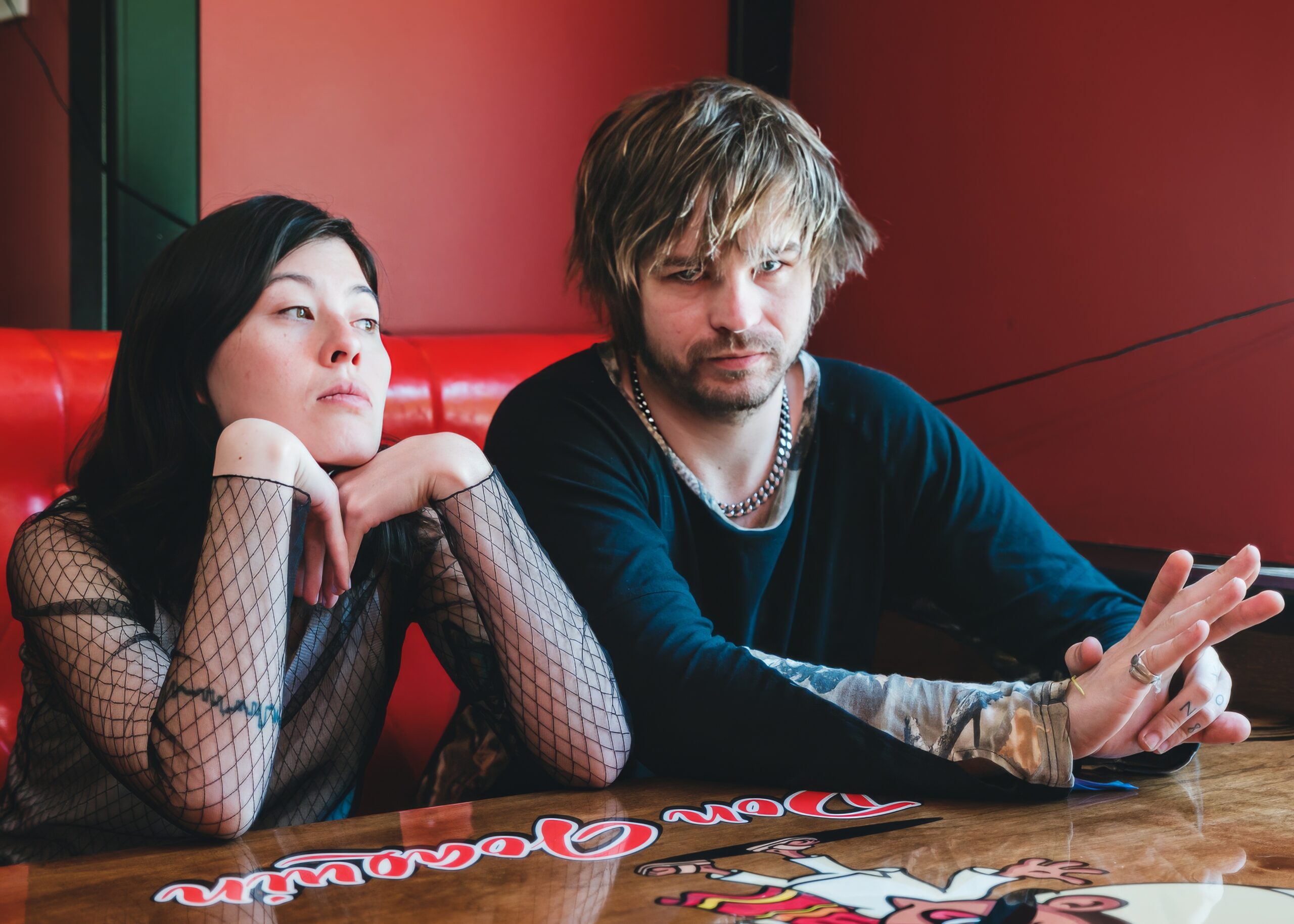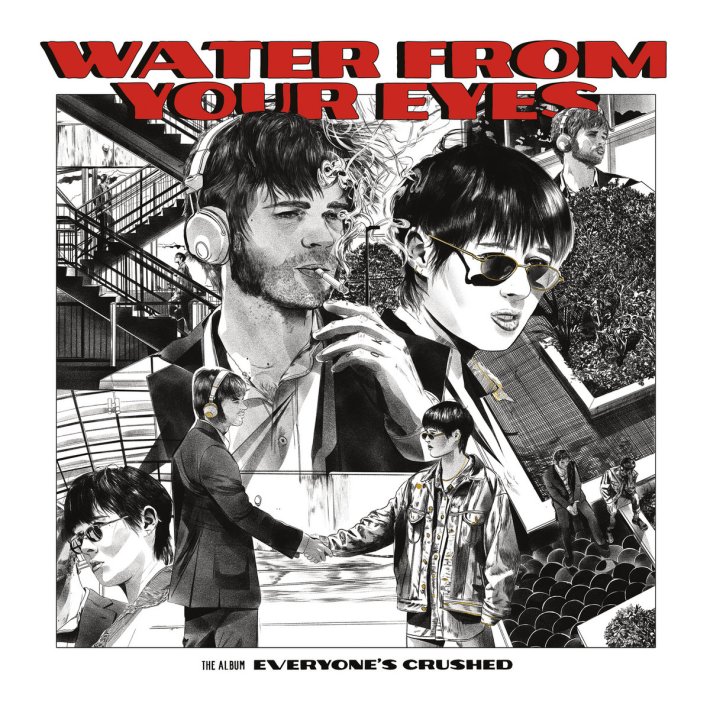Water From Your Eyes look fried. Anyone who has been on tour knows this moment: Outfits become an array of whatever is vaguely clean, the van somehow looks increasingly like one of those old "battle-damaged" action figures, and time becomes both more tangible and completely meaningless, as your life is scheduled down to the minute but every day and every city bleed into one another. This is more or less the state I find Rachel Brown and Nate Amos in when we meet on a corner in Salt Lake City, on a bright Sunday following some long festival nights. By the end of our conversation I'll ask them if we missed anything. Brown will drawl a joking reply: "If I said anything stupid I'd rather have it reflect on my lack of sleep than my intelligence."
All three of us find ourselves in Utah for Kilby Block Party, an SLC event that, in the span of five short years, has gone from literal block party celebrating a local all-ages venue to a rapidly growing festival. By its fourth and fifth iterations, Kilby boasted lineups stacked with indie luminaries from across the generations. But on this Sunday, we're in the thick of town, at Amos and Brown's personal SLC mecca: Don Joaquin Street Tacos. In the grand scheme of things, Water From Your Eyes are relatively new to touring. But they already have that road warrior sensibility, a patchwork of favorite haunts to immediately revisit when you pass back through.
In fairness, pretty much anyone in the duo's position would be fried, too. From the outside, Water From Your Eyes have undergone a transformative year and change. After hanging around Brooklyn DIY circles and churning out releases, Amos and Brown began to garner more attention around 2021's Structure. Then, in February of last year, they announced Everyone's Crushed, their first for the hallowed label Matador. What followed was a whirlwind of press accolades and level-ups, Everyone's Crushed becoming one of the definitive indie albums of 2023 while Water From Your Eyes joined veteran Matador acts like Pavement, Interpol, and Spoon on the road. They haven't had much time to stand still and make sense of it all — their brief respites at home have been dominated by work on the followup to Everyone's Crushed.
Something else that didn't make a whole lot of sense: Water From Your Eyes' set the preceding day. With 2024's iteration of Kilby mainly populated by artists from around the '00s era of blog hype — Vampire Weekend, LCD Soundsystem, Interpol, Jai Paul, Joanna Newsom, etc. — more of-the-moment ascendant names like Water From Your Eyes and their NYC contemporaries Model/Actriz were relegated to afternoon sets that were inevitably incongruous with the nature of their music. It was slightly bemusing to hear the squalls and throbs of something like "Track 5" bursting out from the stage and then turn and see the majestic tranquility of the mountains in broad daylight. Shrouded by sunglasses and a Chicago Bulls jacket, Brown quipped that Radiohead must've written "High And Dry" about this place. They weren't the only singer to remark on the SLC climate over the weekend.
Water From Your Eyes don't really do middle grounds. Their music is an extreme montage of ideas. The patterns of their career are, so far, sharp. For so many years, they were furiously productive and creative, but they never really toured. And then once they started touring, they really started touring. This Kilby stop is in the middle of one leg that is sandwiched between opening slots on Squid and Real Estate runs — keeping Water on the road for much of the early passages of 2024.
While this might've slowed down the incubation of the next Water From Your Eyes album, it hasn't done much to stem the constant flow of work from the band's expanded universe. Before 2023 was out, Brown had returned with an EP under their solo moniker thanks for coming. In September, WFYE touring members Al Nardo and Bailey Wollowitz will make their debut as fantasy of a broken heart, a newly minted Stereogum Band To Watch. And just a few days ago, Stereogum named Amos' latest This Is Lorelei collection Album Of The Week.
"To us they're all very different," Amos says of the various bands in the Water From Your Eyes web. "I could see anybody listening to either project and seeing the connection to Water. Ultimately it's music made by the same people."
Amos and Brown figure they have different relationships to their own solo endeavors and how they relate back to Water From Your Eyes. But both agree thanks for coming and This Is Lorelei are more explicitly personal, whereas Water is filtered through layers of conceptualization. "This is something that's a part of me but also separate," Brown explains. "It's very much its own thing."
For Amos, This Is Lorelei's new album Box For Buddy, Box For Star might be personal in a more potent way than even past releases. After getting getting sober from alcohol and harder drugs during the making of Everyone's Crushed, he decided to experiment: He also quit smoking weed, to challenge himself to write an album without it. "Honestly, I was having a really bad time and the way I dealt with it was writing and recording three songs a day, doing as many push-ups and sit-ups as I could, eating one bowl of ramen a day, and watching bad TV," he says. "It was pretty miserable, but in hindsight it was kind of awesome."
On top of Everyone's Crushed, and the subsequent remix album Crushed By Everyone, solo releases, and all the tour dates, there is also a bit more Water From Your Eyes music on the horizon. During the making of Everyone's Crushed, Amos and Brown recorded a whole album's worth of covers, as they did for 2021's Somebody Else's Songs. As you might imagine from its predecessor's tracklist, the duo took on a wild array of source material. "There was not one but two Sheryl Crow songs," Brown claims.
The covers album has since been culled down to an EP "locked and loaded" for this summer, with several songs including a Chumbawumba track (not the one you think) and Al Green's "Tired Of Being Alone."
Here, the rapport between Amos and Brown becomes evident. A former couple and now long-time close collaborators, the two often speak in a way where they will thoughtfully answer a question, but also do this sort of stoned joke volley between the each other by way of detailing the making of something. Contrary to what one might expect — from the DGAF cool of their press photos, from the noisy onslaught of their live set — Amos and Brown are both affable and often slyly funny in conversation.
"We played it for my parents and my dad started laughing so hard he was crying," Brown says.
"It's my favorite cover we've ever made," Amos continues. "We've made well over 20 at this point."
"I think it's pretty clear I don't have the vocal strength to do Al Green," Brown continues. "I'm so sorry Al Green."
"There's so many things wrong with it," Amos cracks up. "It's kind of a faithful recreation of the song but also not."
Brown again: "I started crying. It's part distress, part… I don't know, I was crying because I was so distressed."
By now everyone has finished their tacos, and Water From Your Eyes are making the — by their own admission — dubious decision to run back to the festival to see their pals Model/Actriz, thus opting for an extremely late night drive to their next destination. They make a comment about how in a year's time Model/Actriz will be too big to play with Water From Your Eyes. But I'm not sure if that's entirely true. Water From Your Eyes are right in the middle of the whirlwind's aftermath now. The acclaimed album, the surge in profile, pounding the pavement back and forth across America. But when the new Water From Your Eyes album arrives next year, it'll be to a level of attention that's never existed around this band. It's easy to imagine the next Water From Your Eyes album being the real leap.
Earlier this year, Water From Your Eyes played their biggest show to date, and possibly the biggest show they'll ever play. A few weeks before Salt Lake City, Brown and Amos were in Mexico City, opening for Interpol on what was, in turn, their biggest show to date. As one might expect, Brown and Amos describe it as a surreal experience.
"We sound checked to a thousand people," Brown says.
"That's bigger than the shows we're playing right now," Amos clarifies.
By the time of their set, that had grown to tens of thousands. Amos, for his part, tries his best to be unaware of his surroundings when onstage. But where it hit Brown was when they saw all the little phone lights spread out in the darkness beyond the stage.
"I was like… that's a whole lot of lights," they deadpan. "And that's not even all the people."
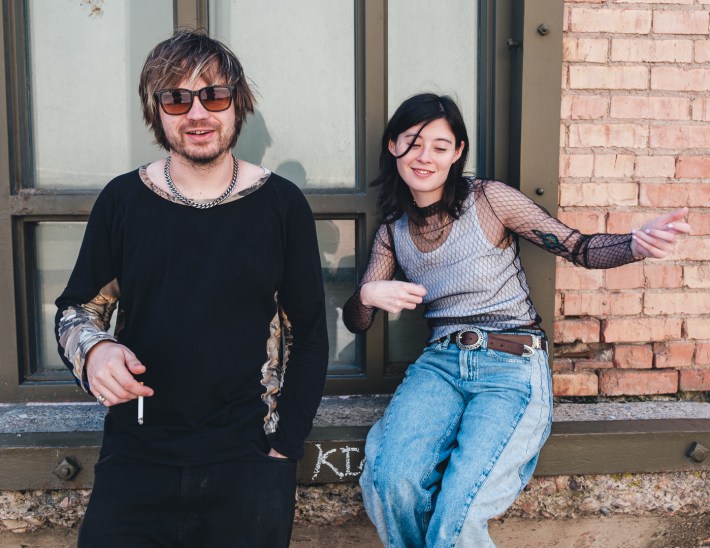

At this point, it's just shy of two weeks since we all met in Salt Lake City, and we're gathered again in a tiny green room backstage at Nashville's Basement East, the same rock club I saw Water From Your Eyes play a few months ago when they were on tour with Squid. Now it's the Real Estate tour, and as we hear that band's familiar jangles reverberate through the walls, we pick up our conversation where we left off in Utah.
The thing is, most bands don't think about the kind of career narratives that develop after a breakthrough like Everyone's Crushed (or, at least, they claim not to). In terms of Water From Your Eyes, they've been on the run so consistently, they haven't had the sort of "normal life" interstitial to truly gauge how much things have changed. Even if a small fraction of the concertgoers gathered in Mexico City had become newly converted Water From Your Eyes fans, that's a lot of new ears. And that's the thing Brown and Amos do seem acutely aware of: that way more people than they expected heard Everyone's Crushed and, for the first time ever, the next Water From Your Eyes album will be released within a context. It will have a label and a backstory and expectations.
Even last year, Amos and Brown were already insinuating they knew what was around the bend following Everyone's Crushed. They said they wanted to make something more positive. Everyone's Crushed, though not without its earworm moments, was certainly a work of frazzled fragmentation — which made sense, considering Amos' battles with addiction during that time and Brown's lyrics reflecting on the more dire elements of American life in recent years.
"It really sucks to be alive at this point in time," Brown asserts. "The people running shit just don't care."
"At a certain point you don't want to just say that again and again and throw more shit in the world," Amos adds, explaining the pivot they envision for Everyone's Crushed’s successor.
Now when they look back on it, they have their warm feelings towards it, but they also realized it allowed more nihilism — or "teenage pessimism," as Amos reframes it — into the music than they really wanted to.
"When I listen to that album, I'm like, 'This is fucking smoked,'" Amos says. "It's really spaced out."
"I'm crazy, and the fact all you other people think this is good — what's going on?" Brown says. "Is everyone OK?"
The entire shape and scope of the next album is still coming into focus. The rhythm of Water From Your Eyes' existence now means they had to abandon their old way of working — constantly making things, discarding things, reviving things. Instead, the next album has been made in sustained bursts in the brief intermissions between heavy touring, with lots of time for ideas to sit and stew and morph, rather than arrive in a chaotic torrent. At the same time, there was a painstaking quality to it.
"Musically, it was a thousand times as stressful," Amos admits. "It's hard, even on a subconscious level, to let go of the inherent pressure of making something that will definitely be heard."
This is the same thread that's influenced the duo's urge to put something more optimistic into the world. "When Everyone's Crushed was made, we had no idea where it was coming out — or if it would come out," Amos recalls.
"Not that we want to placate an audience," Brown continues. "But the idea that we have a platform with the ability to make art — why not make something that's bringing in the energy I think we'd both like to be bringing into the world."
"The last one was reflecting what we were taking in from everything," Amos concludes. "We'd like the next one to be something where we're choosing to be hopeful."
We rely on reader subscriptions to deliver articles like the one you're reading. Become a member and help support independent media!
That element of the album is still being figured out. Brown has yet to write the lyrics, but is carrying two books along on tour as presumptive inspiration: Ursula K. Le Guin's The Dispossessed and Marcello Tarì's There Is No Unhappy Revolution. Musically, the album sounds like it's more complete, though it went through various concepts and overhauls along the way. At one point, it was supposedly going to be a "metal" album, spurred on by the pedal obsessions Amos had developed on tour. At another juncture, it was intended as a full-on techno album. And there's the one song that sounds like the Red Hot Chili Peppers.
"You know how you have to give yourself that one unobtainable goal?" Amos asks. He then explains one Water From Your Eyes dream album, where he writes and records all the music, but then hires John Frusciante, Flea, and Chad Smith to play it, with Brown singing instead of Anthony Kiedis. A warped pop vision where Water From Your Eyes hijacks RHCP, basically.
At various points you can decide how seriously you want to take certain of Brown and Amos' asides — though I will tell you this particular one was accompanied by us gushing over turn-of-the-millennium albums like Californication and By The Way and Amos responding to a question about whether their cool, arty peers think they're bluffing about the RHCP adoration with "That's their problem." This is, however, actually how all Water From Your Eyes albums start. There is a concept, structural or aesthetic or spiritual. That concept is often thrown out and replaced by another, or mutates, or melds with something else. Ultimately, each album does come with some hook, but it goes a way towards explaining why the band's albums have their particular sense of pillaging and colliding various strains of pop history.
That is, at its essence, how Amos views Water From Your Eyes' music. Everyone's Crushed was made with a busted computer and janky recording techniques. I ask if, with the backing of Matador and the pressure of all those industry machinations, the circumstances of the next album will be different. The constant, to Amos, is the fact that Water From Your Eyes works best when "every song is a remix of a song that doesn't exist." He still has to labor away at a computer, cutting and pasting, reworking arrangements. That won't change — not just because that's a core ethos of their music, but because it still isn't realistic.
"Honestly, we can't really afford to hang out in a studio," Amos claims. "It's just not in the cards. Which is great, because I don't want to do that."
It's become a familiar story these days, though still occasionally baffling. Even after linking up with Matador — about which, it should be noted, the duo have nothing but positive things to say— and touring with major indie rock names, Water From Your Eyes aren't exactly flush. All those opening gigs were good for exposure, but didn't do much to fund the operation overall. For their own shows, they're still playing around the 200-cap level, and they keep a lean touring operation — just the four-piece band and a tour manager in a busted-up van. They'll go from moments like that gigantic Interpol Mexico City show to playing to a handful of folks in Boise.
"Other artists are surprised by how much critical success we have vs. financial success," Brown explains. "People have this idea that if you're on a [best-of] list your life must be going well, and I'm broke."
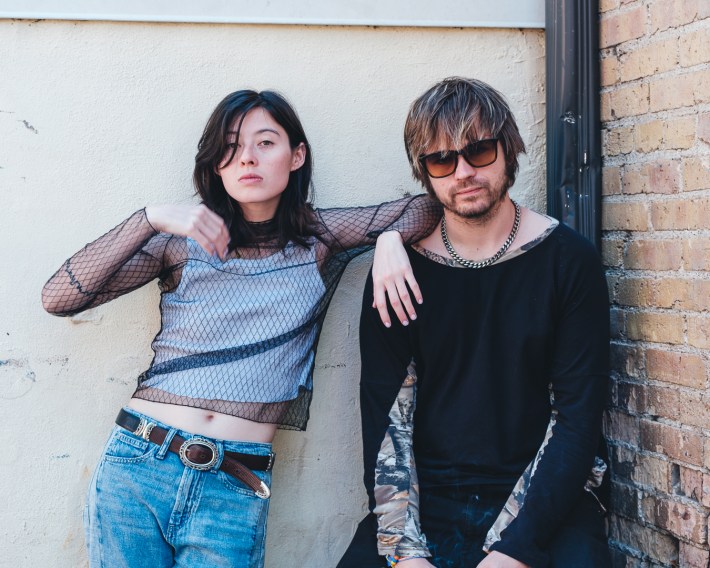
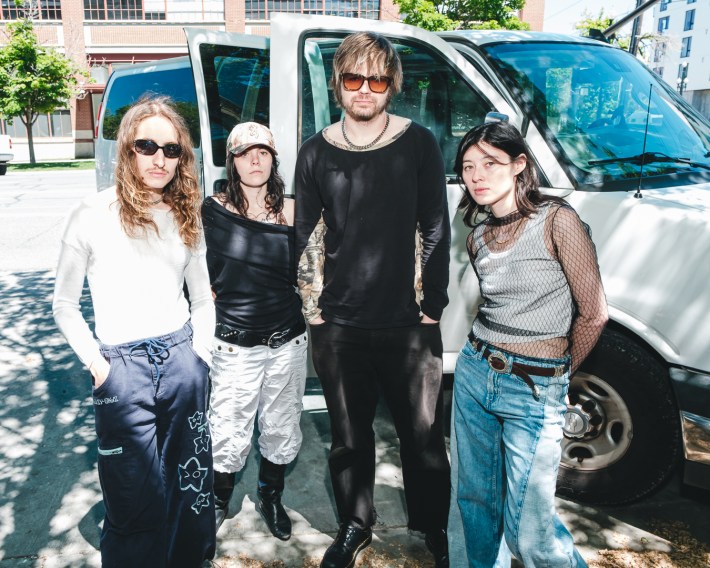
For their part, Brown looks forward to a future where Water From Your Eyes potentially becomes the "day job," the project that offers both them and Amos a sustainable living. But it's still on its way to that. For now, the two of them need their side hustles. Brown opted to give up their apartment and put their things in storage, since they couldn't justify paying rent while being on the road. They are, in a way, still living the day-to-day life of an artist trying to get by in the Brooklyn of the '20s, they're just there a lot less, and playing with much more famous acts.
Brown and Amos are matter of fact about all that though. "We were never a band where we were like, 'We're going to make it,'" Amos says. "Everyone's Crushed was definitely not made thinking 'This one will break us.'"
"We really sold out on that one," Brown says dryly.
"We're an industry plant, don't tell anyone," Amos adds quickly.
"They were teaching us how to dance."
By this point, I'm no longer surprised by the back-and-forth's timbre, the mix of fervor-tempering self-deprecation and the down-to-earth dismantling of perhaps runaway expectations around a band that, to most people, is still going to seem weird as hell. But I'm also thinking back to the band's opening set — cloaked in darkness, augmented by throbbing lights, as the music should be heard. (No disrespect to Utah's beautiful mountains.) I'm thinking about Brown coming onstage and, as a tiny hurricane of noise built around them, asking the crowd: "We're doing this thing where we ask the crowd if you like alternative rock. Do you like alternative rock? Do you like regular rocks from the ground?"
It lands as if there is something meta going on here, but maybe that's just the band. Two idiosyncratic characters, making broken-down, neurotic, kaleidoscopic songs that, in some framework, could be "rock music." They look like rockstars on that night, at least. Amos keeps his head down and coaxes unholy sounds from his guitar, Brown toes this line between being unflappably cool and disarmingly awkward that seems to win everyone over. I watch people thrash to "Barley" and stand rapt during the devastating "14." I'm thinking about how if nothing makes sense these days, then what's really stopping Water From Your Eyes? Maybe the band that makes no sense could be the biggest band, too.
